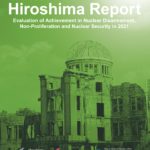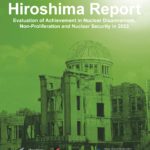Hiroshima Report 20234. The United Kingdom ■Nuclear-Weapon State
| Nuclear Disarmament | 24.5 Points | Full Points 109 | 22.5% |
| The U.K. maintained its nuclear policies formulated in 2021 to increase the limit on the number of an overall nuclear weapons stockpile it possesses to no more than 260, and to impose certain restrictions on transparency. Meanwhile, the U.K. maintained to construct a new class of four SSBNs, as replacement for the existing Vanguard-class vessels. However, the delay of the construction due to technical problems and the cost overruns are pointed out. It has not signed the TPNW. Meanwhile, the U.K. has engaged in joint work to develop nuclear disarmament verification measures with the U.S. and Norway, respectively, and participates in the IPNDV. NWS. It voted in favor of the UNGA resolution on nuclear disarmament proposed by Japan. | |||
| Nuclear Non-Proliferation | 41 Points | Full Points 47 | 87.2% |
| The U.K. acceded to the IAEA Additional Protocol with the provision for complementary access visits. All of its civilian nuclear material is subject to the international safeguards. It has proactively engaged in nuclear non-proliferation, including implementation of export controls. It submitted a report based on the Guidelines for the Management of Plutonium to the IAEA. It continues to engage discussions with the IAEA regarding the implementation of safeguards on nuclear fuel for Australia’s nuclear-powered submarines, which is being promoted by Australia, the U.K. and the U.S. | |||
| Nuclear Security | 22 Points | Full Points 38 | 57.9% |
| The U.K. has ratified all nuclear security-related conventions and established a national implementation system for A/CPPNM. It announced in 2022 a plan to host an IPPAS mission. The U.K. hosted an IPPAS mission in 2016. Their civilian plutonium stockpile has increased slightly. The U.K. announced the “Civilian Nuclear Cybersecurity Strategy 2022.” They participate in all INFCIRC initiatives and continue to contribute to the NSF. | |||






